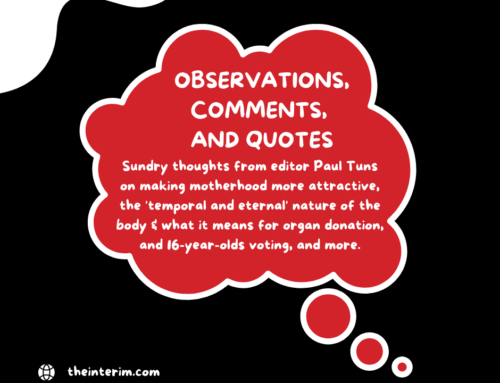Clayton Lee, proprietor of St. Bernard Books, always has a smile on his face when he sees me approach one of his displays at various pro-life conferences and strategy meetings. (If you can’t make it to these events, check out his website at stbernardbooks.com.) Clayton smiles because he knows I’m a sucker for good books and he invariably makes a sale. In October, I bought several volumes, the most enjoyable being Brave New Family, a collection of G.K. Chesterton essays on what we now call the culture wars. Many of the essays and snippets I have come across before in my reading of Chesterton, but Brave New Family is a handy one-stop volume of the author’s wit and wisdom.
Three thoughts predominated as I made my way through the 269 pages. First, that the issues we are dealing with today – attacks on the family, the promotion of birth control, cultural relativism, radical feminism – are not new issues. Chesterton was writing about them in the first half of the 20th century. Second, how prescient he was. Last, that Chesterton is a master of what could be called literary sound bytes. A taste of these sound bytes will prove my other two points.
Discussing feminist doctrines of his day, Chesterton said, “In almost all the modern opinions on women, it is curious to observe how many lies have to be assumed before a case can be made.” In another essay, he said that if the emancipation of women includes “freedom from the responsibility of managing a home and family, an equal right with men in business and social careers, at the expense of home and family, then such progress we can only call a progressive deterioration.”
Progressive, in the political sense, Chesterton was not. He was proudly not a man of his times: “A dead thing can go with the stream,” he wrote in The Everlasting Man, “but only a living thing can go against it.” About the state of political and moral discourse, led by modern philosophers, psychologists and sociologists who go with the stream, Chesterton wrote that they believe their own lies because they “labouriously learned one particular language in which to talk nonsense.”
He thought that there was much muddiness clouding our thinking about the challenges and joys that a new life brings into the world, because we focused on the former and not the latter. He once said that, “The supreme adventure is being born.” And in a poem, “By the Babe Unborn,” Chesterton expressed the anticipation of that adventure, “If only I were born.”
He showed the link between the birth control agenda (“Normal and real birth control,” Chesterton wrote, “is called self-control”) and the eugenics project. Birth control keeps the elite in power: “The landlord or employer says in his hearty and handsome fashion: ‘You cannot expect me to deprive myself of my money. But I will make a sacrifice. I will deprive myself of your children.” In another essay, he said we should ask “anyone who talks about the surplus population … whether he is the surplus population, or if he is not, how he knows he is not.”
Birth control is throwing the baby out with the bath water; or as Chesterton put it, considering birth control as a social reform is akin to saying that “decapitation is an advance on dentistry.” He said that while the birth control advocates claim to have a “quarrel with inhuman conditions,” it is in fact “simply a quarrel with human life.” About one advocate of abortion who wrote a letter to a London newspaper concerned about poverty levels and which was signed “Hopeful,” Chesterton said, “About the mutilation of womanhood and the massacre of men unborn, he signs himself ‘Hopeful.’ He is hopeful of female indignity, hopeful of human annihilation. But about improving the small bad wage he signs himself ‘Hopeless.'”
Chesterton thought families – which he called the “ultimate human institution” – should not be replaced by state institutions and he inveighed against the idea that “the baby is to be left on the doorstep of the state Department for Education and Universal Social Adjustment.”
The moderns, Chesterton wrote, believe in this governing principle: “That the place of the family can now be taken by the state.”
But if the family’s role can be replaced by the state, then the family is more easily dissoluble and we are soon faced with “quick-change acts of bewildering divorce and scattered polygamy.”
In another piece, he describes divorce as “dividing the tune from the words of a song.”
Indeed, Chesterton could be advising the federal Liberal government as it ponders its options on what to do about marriage legislation and the possibility of getting government out of the “marriage business” (see Peter Stock’s story on page 3). Chesterton had this to say about marriage: “If mankind had not been organized into families, it would never have had the organic power to organize into commonwealths.”
We fiddle with custom, tradition and definitions at our own peril. So we fight, hopefully with a compendium of Chesterton by our side to cheer us up, to defend family and the sanctity of human life – “for all that makes life anything but an uncontrollable nightmare.”




